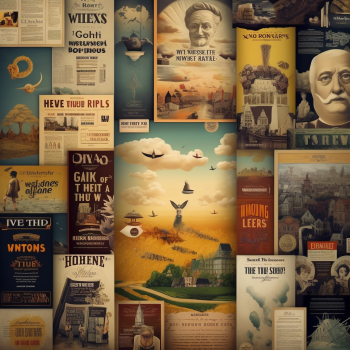Free_to_Choose《自由选择》

简述
封面

影片信息
官方网站
暂无
影片原始规格:
- 中文片名 :自由选择
- 中文系列名:
- 英文片名 :Free to Choose
- 英文系列名:
- 电视台 :PBS
- 地区 :美国
- 语言 :英语
- 时长 :57 min / EP
- 版本 :TV
- 发行时间 :1980
影片内容介绍
劇情簡介
Free To Choose is a landmark television series about the interrelationship of personal, political and economic freedom – ideas that still dominate public policy debates decades after they were first proposed. These are the ideas of Nobel winning economist Milton Friedman and his economist wife, Rose. These ten one-hour programs, filmed on location around the world, have helped millions of people understand the close relationship between the ideas of human and economic freedom. The interaction between these ideas has created, in the United States of America, the richest and freest society the world has ever known. Milton Friedman sees this success threatened when citizens assume that government intervention is the answer to all their problems. In this series, which premiered in the United States on January 11, 1980, Dr. Friedman focuses on basic principles. How do markets work? Why has socialism failed? Can government help economic development? The television series and the book that emerged from it have been watched and read by millions of people around the world. Both have been translated into over two dozen languages.
分集介绍
The Power of the Market
America’s freedom and prosperity derive from the combination of the idea of human liberty in America’s Declaration of Independence with the idea of economic freedom in Adam Smith’s Wealth of Nations. Friedman explains how markets and voluntary exchange organize activity and enable people to improve their lives. He also explains the price system. Friedman visits Hong Kong, U.S. and Scotland.
The Tyranny of Control
Government planning and detailed control of economic activity lessens productive innovation, and consumer choice. Good, better, best, are replaced by “approved” or “authorized.” Friedman shows how “established” industries or methods, seek government protection or subsidization in their attempts to stop or limit product improvements which they don’t control. Friedman visits India, Japan and U.S.
Anatomy of a Crisis
The Great Depression has been popularly viewed as a failure of capitalism. The stock market crash, the failure of the Bank of the United States, loss of personal savings, were visible symbols supporting this belief. As Friedman explains, the real cause was the unseen failure of government policy and action. Yet this crisis resulting from government failure leads to decades of government expansion.
From Cradle to Grave
The welfare state arises from the attempt to do good with other people’s money. Such attempts always fail because: Nobody spends somebody else’s money as carefully as his own. Welfare is supply driven. Those spending the money use force to collect it and to insure those receiving it use it for “right” purposes. Good intentions are corrupted by bad means. Friedman visits U.S. and Britain.
Created Equal
The Declaration of Independence says, “all men are created equal.” Friedman explains that this did not mean all persons should or will have equal talents or income. Equal opportunity to better one’s self, and the right to personally benefit from the gains realized, are consistent with freedom. Equality of results requires force. Taking from some to give to others destroys freedom and removes the incentive for creating new wealth. Friedman visits India, U.S. and Britain.
What’s Wrong With Our Schools
Parental choice and parental responsibility in the education of children is the U.S. tradition and is consistent with a free society. Centralized government control has eroded freedom and adversely affected the quality of education. The poor help pay for education for the future rich. Friedman has long advocated using vouchers to solve the problem. He explains why. Friedman visits U.S. and Britain.
Who Protects the Consumer?
Various government agencies have been created on the claim that they will protect the consumer. These agencies restrict freedom, stifle beneficial innovation, and become agents for the industries or groups they are intended to regulate. Friedman explains how the apparent chaos of the market place, the competition of many suppliers for business, is the best protection of consumer interests.
Who Protects the Worker?
Unions sometimes protect some workers - their members - but usually at the expense of other workers. Government protects its employees and special groups of workers at the expense of other workers. Both unions and government restrict freedom. Friedman explains how the competition of employers for the talents of workers leads to the highest wages and best working conditions.
How to Cure Inflation
Inflation results when the amount of money printed or coined increases faster than the creation of new goods and services. Money is a “token” of the wealth of a nation. If more tokens are created than new wealth, it takes more tokens to buy the same goods. Friedman explains why politicians like inflation, and why wage and price controls are not solutions to the problem. Friedman visits Japan, U.S. and Britain.
How to Stay Free
Democracies have only recently been considered desirable. Historically, it was feared that democracies always self destruct when citizens, forgetting that you cannot remove want and misery through legislation, insist on government actions that physically and morally bankrupt their nation. Friedman explains why the United States has so far avoided this outcome and how we can continue to do so. This program includes an interview of Dr. Friedman by Lawrence E. Spivak.
截图

参考信息
相关的纪录片
暂无
相关领域
| 内容 社会科学类 | 财经 | 微观经济 |
|---|---|---|
| 史地类 | 历史 | 二十世纪 |
| — | — | — |
网路消息
暂无
Category:片名 Category:PBS Category:1980 Category:5. 社会科学类 Category:5.3 财经 Category:5.31 微观经济 Category:6. 史地类 Category:6.1 历史 Category:6.117 二十世纪 Category:6.2 地理 Category:6.24 美洲 Category:6.241 北美洲 Category:6.2417 美国 Category:缺翻译